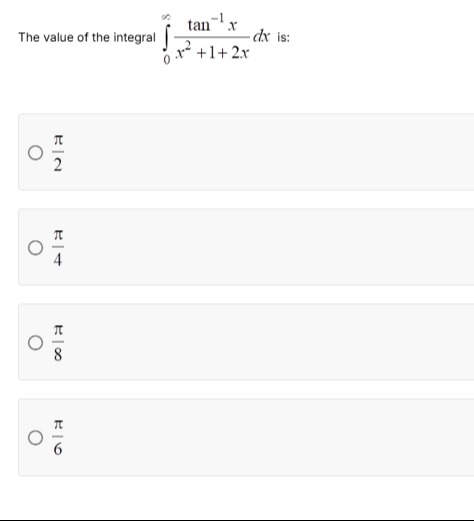Question
Question: The value of the integral $\int_{0}^{\infty} \frac{\tan^{-1}x}{x^2+1+2x} dx$ is:...
The value of the integral ∫0∞x2+1+2xtan−1xdx is:

2π
4π
8π
6π
4π
Solution
The given integral is I=∫0∞x2+1+2xtan−1xdx.
First, simplify the denominator: x2+1+2x=(x+1)2.
So the integral becomes I=∫0∞(x+1)2tan−1xdx.
We will use integration by parts, ∫udv=uv−∫vdu.
Let u=tan−1x and dv=(x+1)21dx.
Then, we find du and v:
du=1+x21dx
v=∫(x+1)21dx=−x+11
Substitute these into the integration by parts formula:
I=[−x+1tan−1x]0∞−∫0∞(−x+11)(1+x21)dx
Evaluate the first term:
[−x+1tan−1x]0∞=limx→∞(−x+1tan−1x)−(−0+1tan−10)
As x→∞, tan−1x→2π. So, limx→∞(−x+1tan−1x)=−∞π/2=0.
Also, tan−10=0. So, −0+1tan−10=0.
Thus, the first term evaluates to 0−0=0.
The integral simplifies to:
I=∫0∞(x+1)(x2+1)1dx
Now, we use partial fraction decomposition for the integrand:
(x+1)(x2+1)1=x+1A+x2+1Bx+C
Multiply by (x+1)(x2+1):
1=A(x2+1)+(Bx+C)(x+1)
To find A, set x=−1:
1=A((−1)2+1)+0⟹1=2A⟹A=21.
Expand the equation and compare coefficients:
1=Ax2+A+Bx2+Bx+Cx+C
1=(A+B)x2+(B+C)x+(A+C)
Comparing coefficients of x2: 0=A+B⟹B=−A=−21.
Comparing constant terms: 1=A+C⟹C=1−A=1−21=21.
So, the partial fraction decomposition is:
(x+1)(x2+1)1=x+11/2+x2+1−1/2x+1/2=2(x+1)1−2(x2+1)x+2(x2+1)1
Now, integrate this expression from 0 to ∞:
I=∫0∞(2(x+1)1−2(x2+1)x+2(x2+1)1)dx
I=[21ln∣x+1∣−41ln(x2+1)+21tan−1x]0∞
Combine the logarithmic terms: 21ln(x+1)−41ln(x2+1)=41[2ln(x+1)−ln(x2+1)]=41ln(x2+1(x+1)2)
So, the integral becomes:
I=[41ln(x2+1(x+1)2)+21tan−1x]0∞
Evaluate at the upper limit (x→∞):
limx→∞(41ln(x2+1(x+1)2)+21tan−1x)
For the logarithmic term: limx→∞x2+1(x+1)2=limx→∞x2+1x2+2x+1=limx→∞1+1/x21+2/x+1/x2=1.
So, limx→∞41ln(1)=0.
For the tan−1x term: limx→∞21tan−1x=21(2π)=4π.
Value at upper limit = 0+4π=4π.
Evaluate at the lower limit (x=0):
41ln(02+1(0+1)2)+21tan−10
=41ln(11)+21(0)
=41ln(1)+0=0.
Finally, subtract the lower limit value from the upper limit value:
I=4π−0=4π.
The final answer is 4π.
